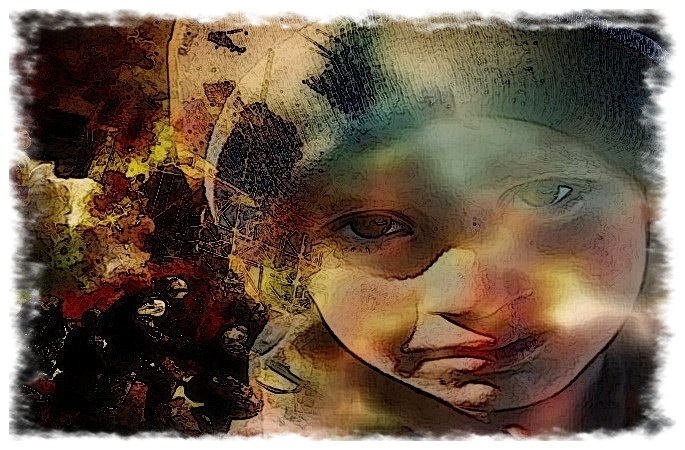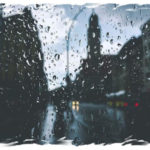Tent flaps flutter in the breeze. Dust stirs and lingers in the air, in the mouth.
Another day—and I’m still here. The queue grows longer every morning. By the time our water container is filled, I’ve at least sweated away half that much fluid. Somewhere down the line, Bill repeats the same story he tells every day: I had a Ute and a boat and a business—a big house—all gone—gone—all gone. I tune out. It sounds callous but there are only so many times one can hear him say it. He is not the only one to suffer, just the most persistent.
Sayeeda, as usual, was up before first light and has already collected her water ration. Her daughter, Siddhi, is playing with mine. It helps to distract them. Sayeeda has eyes like a wedge-tail eagle and Ariel is safer with her than with me. ‘Cassie!’ I hear my name and spin around. I’m almost at the front of the queue. It’s Sayeeda with the little girls.
Ariel leans against me. ‘I’m hungry,’ she tells me. It will be at least a couple of hours before any food materialises. Her cotton dress hangs from her shoulders. She is fast losing her body fat.
In the couple of years of her life before the disasters, she had the luxury of tasting tempting food and has not got used to the high protein rations. Her four-year-old logic can’t make the connection between refusing her rations and screaming with hunger.
‘See, Mummy is right where I said she would be.’ Sayeeda tries to take Ariel’s hand but the child shakes it off.
‘I want something to eat,’ Ariel pleads.
‘You know I have to wait for our water,’ I tell her.
‘My tummy hurts. I want you to come.’
‘Then you’ll be thirsty, and you will wish I had stayed in the queue. Anyway, I need water.’
Ariel thumps my leg.
‘My eyes sting,’ Siddhi complains. ‘I want to go back.’
‘Go on,’ I wave Ariel away but she clings to my leg.
‘Leave her, then,’ I say to Sayeeda.
‘No sense in all of us cooking out here.’
A strong wind brings more gritty red dust and blasted heat from west of the ranges. No birdsong, the birds have disappeared save for a few solitary crows that arc over the camp, seeking the crumbs of human misery. I sing to Ariel about her family, who we are and where
we came from; and how things used to be. In the beginning, when people volunteered to run workshops or were drawn together to share interests, a storyteller and songwriter told us how stories were told and re-told through song. It stuck with me that Ariel shouldn’t lose her sense of self and songs could be a way of preserving that.
By the time I return with the water, Ariel is drowsy, and Siddhi is already napping. My eyes adjust to the dimmer light inside the tent; though it is still suffocatingly hot, any shade is a relief.
I put the water down and settle Ariel to her nap. Sleeping is the best way to bear the midday heat and hunger pains. I hold her hand and sing the rivers and creeks; I sing a fertile land; I sing her grandparents back into existence.
Sayeeda disappears. Ariel and Siddhi toss and turn. I am drifting off from pure indolence when Sayeeda reappears. She opens her hands and reveals milk arrowroot biscuits. I don’t know how she does it. She seems to create solid objects out of thin air. I know better than to ask.
‘Some are more equal than others,’ she says with a wink, ‘I’m just equalising things.’
‘You’re a marvel,’ I say. ‘A magician.’
‘That’s not all—I come bearing tidings.’ Sayeeda sits close to me and pretends to be showing me her big toe as she whispers.
‘This is serious stuff. You can’t even tell Jonathan, you know how he feels about orderly process.’
‘He has his principles.’ I am immediately and unnecessarily defensive of my husband.
‘Principles won’t save you from a grisly fate,’ Sayeeda reminds me.
‘My family waited
years in a camp in Pakistan, watched me grow up there. By the time we were allowed to leave my parents were too ill. They made me and my brothers and sisters go without them. They wouldn’t let even one of us stay to look after them. Years and years we waited to leave that hell-hole.
Do I have your solemn promise that this stays between us?’
I nod and cross my heart. Once I wouldn’t have dreamed of deceiving Jonathan but circumstances change.
‘This time it’s definite, all fixed, are you in?’
‘I’m not sure. You know that it means leaving Jonathan and taking his child from him, possibly forever.’
‘It’s your decision, I can’t help you with that. You have to be one hundred per cent sure.’
‘Are you certain that it will be safe? Do you even know where you’ll end up? What if you’re caught?’
‘I can’t be certain of anything. All I know is I can’t spend years in another camp, watching my daughter grow up. You think this is bad. Just wait a few years.’
‘I’ve been hanging on to the hope that somehow someone somewhere will bail us out; that one day it will all be back the way it was.’
Sayeeda shakes her head. ‘Pollyanna,’ she says.
‘Jonathan is convinced that the government will eventually be able to take the reins and create order again.’
‘He’s worse than you. How can you believe that? Look around, do you see any signs of progress or order? Every day it gets worse and it will continue to get worse.’
My Ute had a bull-bar, I had a boat—a business—a big house—all gone—all gone, Bill wails.
I know that Sayeeda knows what she’s talking about. Jonathan, on the other hand, has a fine mind and firm principles but are short on common sense. A career bureaucrat, he is obsessed with order and process, following rules and regulations for the pure joy of it. His disappointment with the way the infrastructure has failed has not shifted his faith that Australia will work its way through the crisis.
When the disasters first occurred the government was galvanised but after cyclones, floods, earthquakes, landslides, severe drought, and windstorms, it seemed that all over Australia, the land was burning or gaping open or drowning in its own tears. A moving mosaic of homeless, jobless people struggled on together or on their own, fought over the few remaining resources or just gave up altogether. The politicians and bureaucrats blamed each other and threw up their arms in despair. They don’t even bother to visit us anymore. NGO Medical volunteers and basic supply vans are all we ever see now. I have to make this decision alone.
Ariel is curled up, asleep. Can I make time stand still? Is there some way I can freeze this moment when we are at peace? When she is not crying out in hunger or angry with boredom or screaming because she is being bitten by mosquitoes or flies; while she still has some flesh on her bones and some resistance against infection?
Everything passes, Jonathan likes to tell me. He’s quoting from a book about the Buddha. The only constant is change…if we wait the wheel will turn and the troubled times will pass. He’s not above complaining about the camp but is determined to see it through, whatever ‘it’ is. I can tell it takes all his inner strength to try and accept the way things are.
He would rather do that than compromise his integrity or admit that he could be wrong. The westerly picks up again and I drift off. The sound of the tent flapping turns into billowing sails on a brigantine taking me far across the sea.
All too soon, Ariel wakes. Sayeeda and Siddhi are gone. Immediately Ariel starts to grizzle. Can I bear this any longer? If ever I wanted to be prescient it is at this moment. As if my thoughts have reached him, Jonathan appears.
‘What’s wrong, baby?’ he asks Ariel. I wish he wouldn’t call her ‘baby’, she is going to need to be grown up before her years and strong, not a baby.
‘Why don’t you take her for a walk, she’s bored shitless,’ I say to him.
‘Walk, Daddy,’ Ariel repeats.
‘Just a short walk then. You can count the steps we take.’
‘One… two…three…’ I can hear her voice trailing as they walk into the distance.
No sooner has he left than Sayeeda reappears.
‘You have to decide by tonight.
Last chance—and only that because I insisted.’
I don’t know what to say, my mind is churning over the options. Stay here together as a family and hope all will one day return to relative normalcy or that some other country will take us in, or take a chance on speeding up the process by taking the initiative. I have never been a gambler but life here has ground to a halt. People are disappearing every day.
Rumours are rife of conspiracies, disease, promised lands—no one is sure of anything but everybody has a theory. ‘By tonight,’ I promise.
‘I have to go,’ she says. ‘If you decide you are with us, wrap up anything of value you still have that’s portable and tie it firmly around your waist under your shirt. I’ll be back after sundown. There’s a lot to do.’
When Jonathan returns with Ariel, I feel a sense of betrayal. If only he could be more flexible so that I could share with him the events that are unfolding in the interstices of time and space.
Ariel begins to vomit. She has practically nothing in her stomach, how can she vomit anything? Nothing but retching and a watery substance escape from her mouth.
‘What has she been doing?’ I ask in a panic. ‘What has she eaten?’
Jonathan looks annoyed. ‘We went for a walk. She hasn’t eaten anything.’ I ask Ariel. She nods.
Jonathan is flabbergasted. ‘When did you eat something?’
‘When you were talking to that man,’ she gasps. ‘Another man gave me…’ Ariel retches again.
‘Why did you take it, you know the rules,’
Jonathan begins exasperated. I look at him in disgust.
‘What?’ He turns his anger to me.
‘She’s four years old.’ I point out.
‘Nearly five and old enough to know what rules are.’
I shake my head. There is no getting through to him.
As the afternoon wears on Ariel deteriorates. She shivers violently. All the afternoon I hover over her. The back of my hand on her forehead keeps track of her rising temperature. Her nose starts to bleed and she groans. As the day wears on she becomes increasingly febrile. I know that we won’t be going anywhere tonight.
Eventually, a paramedic appears, she touches Ariel’s abdomen, and the child groans loudly. The paramedic wastes no time. ‘We have to transfer to isolation,’ she tells me.
My head spins, what is she saying, where are they taking my daughter? What’s wrong?
Jonathan lifts Ariel up in his arms and I follow them. Inside the isolation tent, the paramedic finally whispers ‘typhoid outbreak’.
My heart shrivels to the size of a walnut.
‘Not Ariel,’ I can hear the horror in my voice.
‘Are you sure it’s not something she ate?’
‘It looks like typhoid. I’ve sent for antibiotics.’
‘Sent for them!’ Jonathan sounds like a wounded animal as he roars at her.
‘Antibiotics are not easy to get, we have to apply for and account for every dose.’
‘In the meantime?’ I ask.
‘We keep her as calm and comfortable as possible and keep her hydrated.’
‘Best case scenario?’
‘The antibiotics arrive in time and she’ll be okay in a couple of weeks.’
‘Worst case?’
‘Continuing rising temperature, dehydration, possible intestinal perforation which is frequently fatal.’
I turn to Jonathan—he is staring at the ground.
‘You, too, are now in isolation,’ the paramedic informs us.
I feel a sense of panic, how will I tell Sayeeda? What will she be thinking? What about Siddhi?
I know better than to interfere in Sayeeda’s affairs and I can’t risk sending her a message. I know she will be disappointed in me for leaving her high and dry.
‘The antibiotics…’ Jonathan begins, ‘how soon…?’
The paramedic shakes her head, ‘there’s no telling, really.’
‘You and your damn proper process!’ I shout at him. ‘What good is it now?
What good is all that to Ariel? To me?’ I bite my tongue before I say any more.
I have to keep silent.
I know nothing, I am nothing, I feel nothing.
I have joined the queue of the living dead. I hold Ariel’s hand and begin to sing.



